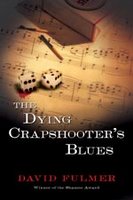 The Dying Crapshooter’s Blues
The Dying Crapshooter’s BluesBy David Fulmer
Harcourt, Inc.
0-15-101175-3
Jazz has had several of its own sleuths, notably Bill Moody’s Evan Horne and David Fulmer’s own Valentin St. Cyr series. Now Fulmer gives the blues its due in the mystery genre with The Dying Crapshooter’s Blues.
Set in Atlanta during the 1920’s, Crapshooter tells the story of the shooting and drawn out death of Little Jesse Williams, a smalltime gambler, pimp, and general “rounder.” As Williams’ friends pay their respects on his deathbed, two receive special requests. Blind Willie McTell, the legendary bluesman, is charged with immortalizing Williams in a song to be sung over his grave, to be entitled: “The Dying Crapshooter’s Blues,” which can be found on many McTell compilations, including Atlanta Twelve-String. Joe Rose, a more successful thief and gambler of uncertain ethnicity, gets the unenviable task of investigating the soon-to-be murder.
As in any good blues song, there is a woman involved. Her name is Pearl Spencer, an old acquaintance of Rose’s, who drags him into the investigation of a high society burglary, which draws all the attention of the corrupt Atlanta P.D., (as opposed to the shooting of the African-American rounder). Indeed, as Rose starts asking questions about each crime, he starts to suspect they may both relate to corruption within the police force.
Fulmer shows a deep appreciation of the period and seamlessly weaves the real-life figure of McTell throughout the story. He shows his blues record collector sympathies in a side-plot involving Columbia Records field recorders. The real blues sensibility comes out in the gothic death-watch that dominates the story and McTell’s blues that commemorates the death of Little Jesse. Fulmer vividly describes McTell writing his celebrated lyrics in claustrophobic conditions as his friend slips away:
“The blind man sang the first lines.
Little Jesse was a gambler, night and day
Well, he used crooked cards and dice
A sinful guy, good-hearted, but had no soul
Heart was hard and cold like ice
Jesse was a wild reckless gambler, he won a gang of change
Many gambler’s heart he let in pain
When he began to spend and lose his money,
he began to be blue and all alone
But boys, his heart had even turned to stone
Willie hesitated, then spoke the rest of it.
What broke Jesse’s heart, why he was blue and all alone
Sweet Lorena packed up and gone . . .
At that, Jesse opened his eyes again and smiled, his face softening with a sweet sadness. ‘You gonna make me famous, Willie?’” (p. 97)
That’s what the blues are all about.
Crapshooter is more period crime story than mystery. Fulmer tips his hand revealing most of the villains fairly early, but he makes low-life 1920’s Atlanta a compelling backdrop to the story. Fulmer also uses the historic realities of segregated Atlanta to heighten the tension. Indeed, investigating the Williams shooting is a very dangerous pursuit for Rose, especially when it leads back to crooked cops. Fulmer has a good ear for dialogue and for music, which enriches the story. It is a well-paced read that blues aficionados and period mystery readers should both appreciate.